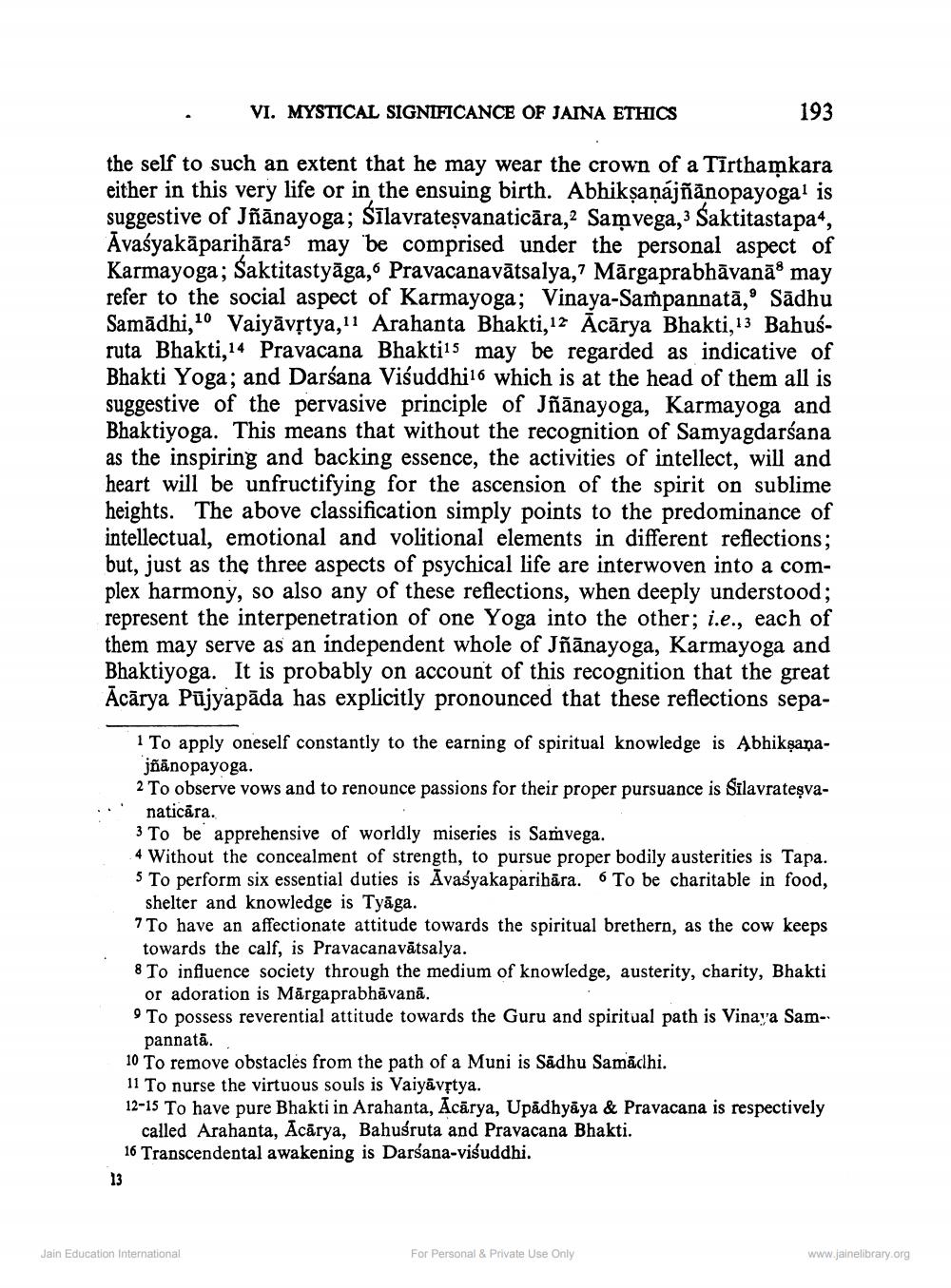________________
VI. MYSTICAL SIGNIFICANCE OF JAINA ETHICS
193
the self to such an extent that he may wear the crown of a Tirthamkara either in this very life or in the ensuing birth. Abhikṣaṇajñānopayogal is suggestive of Jñānayoga; Sīlavrateşvanaticāra,2 Samvega, 3 Saktitastapau, Āvasyakāparihāras may be comprised under the personal aspect of Karmayoga; Saktitastyāga, Pravacanavātsalya,7 Mārgaprabhāvanā may refer to the social aspect of Karmayoga; Vinaya-Sampannatā, Sadhu Samādhi, 10 Vaiyāvstya, 11 Arahanta Bhakti,12 Ācārya Bhakti,13 Bahusruta Bhakti, 14 Pravacana Bhaktiis may be regarded as indicative of Bhakti Yoga; and Darśana Visuddhi16 which is at the head of them all is suggestive of the pervasive principle of Jñānayoga, Karmayoga and Bhaktiyoga. This means that without the recognition of Samyagdarśana as the inspiring and backing essence, the activities of intellect, will and heart will be unfructifying for the ascension of the spirit on sublime heights. The above classification simply points to the predominance of intellectual, emotional and volitional elements in different reflections; but, just as the three aspects of psychical life are interwoven into a complex harmony, so also any of these reflections, when deeply understood; represent the interpenetration of one Yoga into the other; i.e., each of them may serve as an independent whole of Jñānayoga, Karmayoga and Bhaktiyoga. It is probably on account of this recognition that the great Acārya Pujyapāda has explicitly pronounced that these reflections sepa
1 To apply oneself constantly to the earning of spiritual knowledge is Abhikṣana
jñānopayoga. 2 To observe vows and to renounce passions for their proper pursuance is Silavrateşva
naticāra. 3 To be apprehensive of worldly miseries is Samvega. 4 Without the concealment of strength, to pursue proper bodily austerities is Tapa. 5 To perform six essential duties is Avaśyaka parihāra. 6 To be charitable in food,
shelter and knowledge is Tyāga. 7 To have an affectionate attitude towards the spiritual brethern, as the cow keeps
towards the calf, is Pravacanavātsalya. 8 To influence society through the medium of knowledge, austerity, charity, Bhakti
or adoration is Mārgaprabhāvanā. 9 To possess reverential attitude towards the Guru and spiritual path is Vinaya Sam
pannatā. 10 To remove obstacles from the path of a Muni is Sadhu Samādhi. 11 To nurse the virtuous souls is Vaiyāvstya. 12-15 To have pure Bhakti in Arahanta, Acārya, Upadhyāya & Pravacana is respectively
called Arahanta, Acārya, Bahuśruta and Pravacana Bhakti. 16 Transcendental awakening is Darsana-visuddhi.
Jain Education International
For Personal & Private Use Only
www.jainelibrary.org




